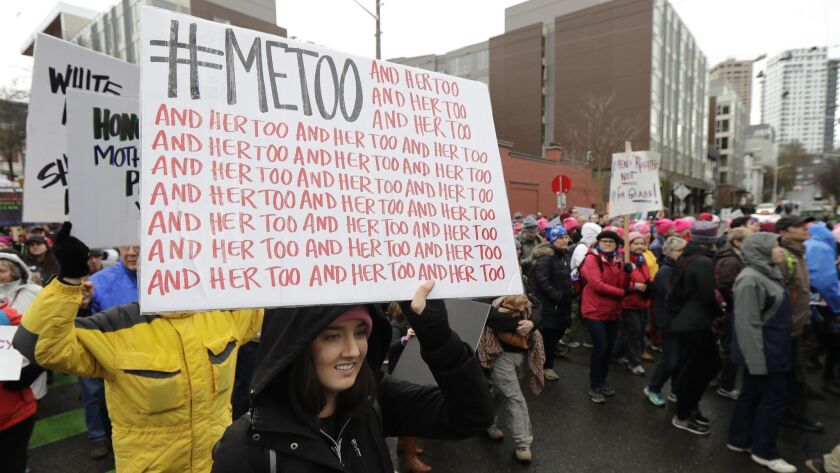Students and Teachers Opinions on the Me-Too Movement
By Matthew Wong, Issue 1 - October 2019

A demonstrator carries a #MeToo sign at a women’s march in
Seattle. Caption credit to LATimes, photo credit to Ted S. Warren from Associated Press
Nikita Manyrin (Year 9):
In my opinion, I do not think that Brett Kavanaugh is guilty because of a
lack of evidence and because the main accusers cannot recall basic
information such as at which house it happened, when it happened, as
well as how old they were when the alleged assault happened.
However, I also believe that even though he can not be proven guilty
(because of lack of evidence, since there is no evidence, he can't be guilty
as innocent until proven guilty), I think that he should not be granted a
position on the Supreme Court of the United States. As even though there
is no evidence to these claims, it should still be noted that the accusers
gain nothing politically from these accusations which could further prove
them to be true. I also feel that since he is running for a position on the
Supreme Court, his slate of judgement shouldn't be stained with
accusations such as these as it could prove hypocritical in certain cases.
Also, how can judgement be blind when it itself could have committed
such crimes?
Ms. H - Denise Hui Bon Hoa (Teacher):
Over the last year, my social media news feeds have been populated with
#MeToo. The movement truly serves its purpose of demonstrating the
shocking magnitude of the global sexual assault problem. Each time
someone steps up to tell her story, on any platform, I am overcome with
both sadness and admiration. But each time, I also dread the reactions
that I know are coming.
Victims often don’t report, usually because they are terrified of the
repercussions, which include being aggressively shamed and threatened.
And in an era where people have elected an accused sexual predator to
lead one of the world’s most powerful nations, it must come to no one’s
surprise that women feel unsafe; that we know our bodies and our truths
are undervalued. So imagine the damaging effect it would have when a
woman who has suffered a sexual assault musters up the extreme
courage to speak out - only to have people either blame her for what
happened (“Did she drink too much? Did she flirt or lead him on?”) or to
totally discount her story and accuse her of lying (“Why would she wait so
long to come forward? Why doesn’t she remember each precise detail of
what happened?”). If you find yourself asking these questions, I urge you
to put yourself in the shoes of the victim. Ask yourself these questions
instead: What could she possibly have to gain by coming forward? Why
would she lie? If it weren’t true, why would she further risk her safety and
her reputation knowing that there’s no guarantee her assaulter will even
face a punishment?
It is horrifying enough that the least taxing way for a victim to deal with
her assault is to keep quiet about it. So, when people do speak out, please
make it a point to listen to them. Understand that this is a widespread
epidemic; that the likelihood any given woman has been assaulted is
alarmingly high. Even if you have your own preconceived notions about
assault accusations, put those aside for a moment. Don’t doubt their
stories. Choose instead to lift victims up by believing them.
